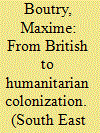|
|
|
Sort Order |
|
|
|
Items / Page
|
|
|
|
|
|
|
| Srl | Item |
| 1 |
ID:
179773


|
|
|
|
|
| Summary/Abstract |
The relations between society and non-governmental organizations (NGOs) have been relatively neglected in the field of China NGO studies, which remains largely wedded to a state–NGO problematic within a state–society framework. In this anthropological study of an NGO’s post-Wenchuan earthquake recovery programme, we adopt an actor-oriented approach to identify the main lines of tension between the strategies, rationalities, and techniques deployed by the different actors in the field. Focusing on NGO–society relations, we take the NGO not as an incarnation of society vis-a-vis the state, nor as an incarnation of the state vis-a-vis society, but as a key link in a shifting chain of state and non-state actors that aims to introduce to local society an assemblage of techniques, discourses, and values for the promotion of self-government. This ‘international development package’ is a specific form of what social scientists have theorized as ‘governmentality’. In this case study, the modalities of participation and cooperative self-government promoted within this development package are in tension with local values, social relations, and political structures. The case shows that dynamic tensions between the actors are mediated by the deployment of practices of governance that circulate between international institutions and networks, state agencies, NGOs, and local authorities and actors.
|
|
|
|
|
|
|
|
|
|
|
|
|
|
|
|
| 2 |
ID:
128882


|
|
|
|
|
| Publication |
2013.
|
| Summary/Abstract |
The humanitarian response to the disaster caused by Cyclone Nargis that hit the Ayeyarwady Delta region of Myanmar in 2008 is a pertinent example of a very specific phase in humanitarian response at the transition between emergency and development. The author shows that this phase, known as 'early recovery', being built on the specific characteristics of the emergency (lack of time and lack of means and input) and oriented towards development, is one in which the humanitarian aid agency is relatively restricted to the humanitarian sphere itself. As a result, the ideological discourse lengthily denounced by the post-structuralist anthropology of development - as a set of Western values imposed on the 'developing' countries to assert a new form of dominion - is actually powerful and quasi-monolithic in shaping the consequences of humanitarian aid. While there is no 'arena' for the 'beneficiaries' to discuss the aid's agency, a 'methodological populism' approach reveals, on the one hand, the antagonisms between a humanitarian ideology conveying considerations such as 'horizontal' communities versus 'hierarchical bonds' and, on the other, the similarity of its socioeconomic consequences on the Delta's society to those of the British colonial period.
|
|
|
|
|
|
|
|
|
|
|
|
|
|
|
|
|
|
|
|
|